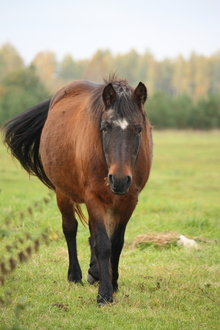Newsdate: Tue 12 April 2016 â 07:00 am
Location: PLYMOUTH, Massachusetts
In their latest blog post, SmartPak cites a recent study that found that over 50% of horses and ponies are overweight.1 This is especially concerning because obesity can have serious impacts on a horseâs overall health and soundness.

Keeping your horse fit
The more your horse moves, the more calories heâll burn, but all exercise isnât created equal! Keeping your easy keeper turned out as much as possible is a great way to maximize his passive exercise.
But it can be hard to know how to support an easy keeper â after all, there arenât equine gyms on every corner (imagine the selfies!) or trendy new diets (paleo ponies, anyone?). Luckily, when it comes down to it, weight management for horses, as for humans, consists of two basic areas â diet and exercise.
Dietary Doâs and Donâts
Do: Support your horse from the inside
A healthy metabolism is key to helping your horse regulate his weight effectively. In addition to diet and exercise, a supplement that supports normal metabolic function may help your horse achieve and maintain a healthy weight. Ask your veterinarian if SmartMetabo-Lean⢠Pellets is right for your easy keeper.
Donât: Pour on the grain
Grain has become a staple in many barns, and a lot of riders think itâs a fundamental part of all horsesâ diets. In reality, grain should be used only for horses that arenât able to maintain their body weight on hay alone. Since your easy keeper has no problem keeping weight on, he doesnât need grain. Instead, add a ration balancer or vitamin/mineral supplement to complement the nutrients heâs getting from his hay.
Do: Use a hay net
Your horseâs GI tract was designed to be constantly digesting forage, so long periods without food can make for an upset stomach and an unhealthy horse. But free choice hay can make an easy keeper pack on the pounds. Get the best of both worlds with the SmartPak Small Hole Hay Net. The small holes allow limited access so the hay your horse can have lasts longer.
Donât: Go graze-y
While pasture is your horseâs natural feed source, itâs not the best choice for an easy keeper. Thatâs because pasture is higher in non-structural carbohydrates (NSC) like sugars and starches than hay, which can contribute to weight gain. Use the Tough 1 Easy Breathe Grazing Muzzle to limit your horseâs pasture intake while still letting him get the benefits of turnout time.
Letâs get physical!
The more your horse moves, the more calories heâll burn. But all exercise isnât created equal! Keeping your easy keeper turned out as much as possible is a great way to maximize his passive exercise (meandering around the field with his buddies).
But even better than passive exercise is active, controlled exercise. When it comes to losing and maintaining weight, your easy keeper will get greater benefits from controlled exercise, like riding or lunging, than simple turnout alone.
1Source: Thatcher, C.D., Pleasant, R.S., Geor, R.J. and Elvinger, F. (2012), Prevalence of Overconditioning in Mature Horses in Southwest Virginia during the Summer. Journal of Veterinary Internal Medicine, 26: 1413â1418.
